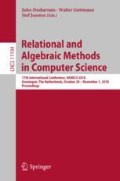Abstract
We investigate when non-dictatorial aggregation is possible from an algorithmic perspective, where non-dictatorial aggregation means that the votes cast by the members of a society can be aggregated in such a way that the collective outcome is not simply the choices made by a single member of the society. We consider the setting in which the members of a society take a position on a fixed collection of issues, where for each issue several different alternatives are possible, but the combination of choices must belong to a given set X of allowable voting patterns. Such a set X is called a possibility domain if there is an aggregator that is non-dictatorial, operates separately on each issue, and returns values among those cast by the society on each issue. We design a polynomial-time algorithm that decides, given a set X of voting patterns, whether or not X is a possibility domain. Furthermore, if X is a possibility domain, then the algorithm constructs in polynomial time such a non-dictatorial aggregator for X. We also design a polynomial-time algorithm that decides whether X is a uniform possibility domain, that is, whether X admits an aggregator that is non-dictatorial even when restricted to any two positions for each issue. As in the case of possibility domains, the algorithm also constructs in polynomial time a uniform non-dictatorial aggregator, if one exists.
Access this chapter
Tax calculation will be finalised at checkout
Purchases are for personal use only
References
Arrow, K.J.: Social Choice and Individual Values. Wiley, New York (1951)
Bessiere, C., Carbonnel, C., Hebrard, E., Katsirelos, G., Walsh, T.: Detecting and exploiting subproblem tractability. In: IJCAI, pp. 468–474 (2013)
Bulatov, A.A.: A dichotomy theorem for constraint satisfaction problems on a 3-element set. J. ACM (JACM) 53(1), 66–120 (2006)
Bulatov, A.A.: Complexity of conservative constraint satisfaction problems. ACM Trans. Comput. Logic (TOCL) 12(4), 24 (2011)
Carbonnel, C.: The dichotomy for conservative constraint satisfaction is polynomially decidable. In: Rueher, M. (ed.) CP 2016. LNCS, vol. 9892, pp. 130–146. Springer, Cham (2016). https://doi.org/10.1007/978-3-319-44953-1_9
Carbonnel, C.: The meta-problem for conservative Mal’tsev constraints. In: Thirtieth AAAI Conference on Artificial Intelligence (AAAI-2016) (2016)
Dokow, E., Holzman, R.: Aggregation of binary evaluations. J. Econ. Theory 145(2), 495–511 (2010)
Dokow, E., Holzman, R.: Aggregation of non-binary evaluations. Adv. Appl. Math. 45(4), 487–504 (2010)
Endriss, U.: Judgment aggregation. In: Brandt, F., Conitzer, V., Endriss, U., Lang, J., Procaccia, A.D. (eds.), Handbook of Computational Social Choice, pp. 399–426. Cambridge University Press (2016)
Kirousis, L., Kolaitis, P.G., Livieratos, J.: Aggregation of votes with multiple positions on each issue. In: Höfner, P., Pous, D., Struth, G. (eds.) RAMICS 2017. LNCS, vol. 10226, pp. 209–225. Springer, Cham (2017). https://doi.org/10.1007/978-3-319-57418-9_13
Larose, B.: Algebra and the complexity of digraph CSPs: a survey. In: Dagstuhl Follow-Ups, vol. 7. Schloss Dagstuhl-Leibniz-Zentrum fuer Informatik (2017)
List, C., Puppe, C.: Judgment Aggregation: A Survey (2009)
Nehring, K., Puppe, C.: Strategy-proof social choice on single-peaked domains: possibility, impossibility and the space between. University of California at Davis (2002). http://vwl1.ets.kit.edu/puppe.php
Schaefer, T.J.: The complexity of satisfiability problems. In: Proceedings of the 10th Annual ACM Symposium on Theory of Computing, pp. 216–226 (1978)
Sharir, M.: A strong-connectivity algorithm and its applications in data flow analysis. Comput. Math. Appl. 7(1), 67–72 (1981)
Szegedy, M., Xu, Y.: Impossibility theorems and the universal algebraic toolkit. CoRR, abs/1506.01315 (2015)
Szendrei, Á.: Clones in Universal Algebra, vol. 99. Presses de l’Université de Montréal, Montreal (1986)
Tarjan, R.E.: Depth-first search and linear graph algorithms. SIAM J. Comput. 1(2), 146–160 (1972)
Acknowledgements
The research of Lefteris Kirousis was partially supported by the Special Account for Research Grants of the National and Kapodistrian University of Athens. The work of Phokion G. Kolaitis is partially supported by NSF Grant IIS-1814152.
Author information
Authors and Affiliations
Corresponding author
Editor information
Editors and Affiliations
Rights and permissions
Copyright information
© 2018 Springer Nature Switzerland AG
About this paper
Cite this paper
Kirousis, L., Kolaitis, P.G., Livieratos, J. (2018). On the Computational Complexity of Non-dictatorial Aggregation. In: Desharnais, J., Guttmann, W., Joosten, S. (eds) Relational and Algebraic Methods in Computer Science. RAMiCS 2018. Lecture Notes in Computer Science(), vol 11194. Springer, Cham. https://doi.org/10.1007/978-3-030-02149-8_21
Download citation
DOI: https://doi.org/10.1007/978-3-030-02149-8_21
Published:
Publisher Name: Springer, Cham
Print ISBN: 978-3-030-02148-1
Online ISBN: 978-3-030-02149-8
eBook Packages: Computer ScienceComputer Science (R0)

